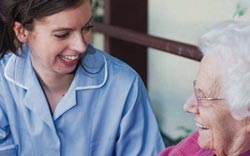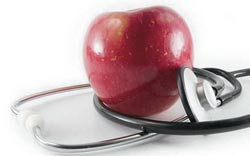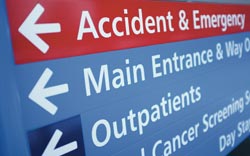
The NHS is the pride of Britain. It provides a wide range of health services.
The vast majority of these services are free at the point of use for people legally resident in the United Kingdom.
The central principles underpinning the NHS are clear:
The health service will be available to all and financed entirely from taxation, which means that people pay into it according to their means.
The NHS was founded in 1948 to honour the commitments made by the Labour Government elected in 1945.
Today the NHS faces great challenges. It is estimated that without radical changes to the way the system works, as demand rises, and costs rise too, the NHS will become unsustainable, with huge financial pressures and debts.
If we make no changes we face a £30 billion funding gap for the NHS nationally by 2020.
So how do we preserve the values of a universal health service, free at the point
of use?
• Nearly two-thirds of people admitted to hospital
are over 65 years old
• There are more than 2 million unplanned admissions
per year for people over 65, accounting for nearly
70% of hospital emergency bed days
 Dealing with an ageing population
Dealing with an ageing population
The UK’s population is ageing. One consequence is a significant increase in the number of people with long-term conditions – for example, heart disease, diabetes and hypertension.
The NHS is hit with rising demand and costs.
Over 15 million people in England have a Long Term Condition. They make up a quarter of the population yet they use a disproportionate amount of NHS resources:
50% of all GP appointments, 70% of all hospital bed days and 70% of the total health and care spend in England.
The BNP say that the NHS must seek to reduce demand by working with agencies to provide community-based care and giving support for the management of conditions by patients themselves.
That will mean fewer hospital visits and costs to the NHS.
Over the past 10 years there has been a 35% increase in emergency hospital admissions.
You probably read all the headlines about the winter crisis in emergency centres.
Both Labour and the Tories have failed to solve the underlying problems.
The BNP loves the NHS and wants to see it thrive.
That’s why we understand that poor co-ordination between adult social care, community services and hospitals is a big part of the problem.
The BNP want a fully integrated strategy across health and social care.
It’s no good having a system where the support services necessary to release someone from hospital are not ready when required or simply unavailable completely.
 Prevention and early diagnosis key
Prevention and early diagnosis key
It’s commonsense that the more we can prevent disease the less strain that there will be on the NHS. It’s also vital that we diagnose conditions early enough to make a difference. We aren’t as good at this as we should be.
Unpopular though it might be the BNP says that people need to take responsibility for their own health and lifestyle choices.
Substance abuse and diet are only two areas where lifestyle choices affect personal health.
Current forecasts state that 46% of men and 40% of women will be obese by 2035.
The result is likely to be 550,000 additional cases of diabetes, and 400,000 additional cases of stroke and heart disease.
That’s going to put a lot more pressure on the NHS.
Of course the government needs to educate and the financial and physical environment must be improved but individuals must also face-up to their own responsibility.
There are now 800,000 people living with dementia in the UK. Diagnosis is often slow and patients and their families often don’t get the support they need.
Back in 2010 research presented to the International Conference on Alzheimer’s Disease showed that diagnosis of dementia followed by information and support reduces outpatient costs by almost 30 percent.
It’s not just dementia of course, early diagnosis can be crucial in a number of conditions – both for the patient and NHS costs.
Join the BNP online here, or join over the phone by calling now on 0844 809 4581.
If you are unable to join a political party, do your bit by making a donation online here today.



